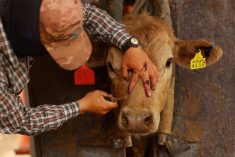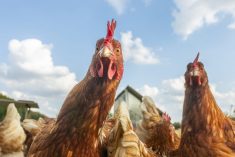Ontario Provincial Police and the Canadian Food Inspection Agency are looking for a flock of sheep that has disappeared from a southeastern Ontario farm under quarantine for scrapie.
The CFIA said in a release Monday that the animals in question are "suspected of having scrapie," a federally reportable nerve disease related to BSE in cattle and Creutzfeldt-Jakob disease in people.
The sheep were found to be missing the same day 41 of the "apparently healthy" animals, including 20 pregnant ewes, were scheduled to be destroyed by CFIA order. That’s according to an earlier release from Karen Selick, a lawyer for the Calgary-based Canadian Constitution Foundation, representing producer Montana Jones.
Read Also

U.S. livestock: Cattle strength continues
Cattle futures on the Chicago Mercantile Exchange were stronger on Friday, hitting fresh highs to end the week.
Local media show Jones’ farm at Trent Hills, about 50 km east of Peterborough, has attracted a number of protesters urging a reprieve for the sheep.
According to a news report Monday from Peterborough TV station CHEX, an unknown party took a number of the sheep from Jones’ barn sometime between Sunday evening and Monday morning and left a note saying the animals were in "protective custody."
All of the condemned animals tested by CFIA previously tested negative for scrapie in live biopsies, and none of the animals had shown clinical symptoms of the disease in the 12 years Jones has raised sheep, the foundation previously alleged.
A single sheep Jones sold to an Alberta farm in 2007 was later found to have scrapie, the foundation said, alleging scientists can’t accurately determine when or where it acquired the illness.
Jones’ farm, the foundation said, has "nevertheless been under quarantine" since January 2009, causing "great financial hardship."
Jones, in the foundation’s release last week, described her sheep as Shropshires, an "endangered breed," noting "they’re due to have lambs soon so I’m expecting 30 to 40 new babies. If CFIA kills my pregnant mothers, there will be only 107 or so females left in Canada."
Jones said CFIA staff have rejected her proposed "alternative risk-control measures," such as taking 30 sheep for destruction and testing while allowing her to keep back 11 of "the most significant rare breeding stock."
"They have also been refusing to allow a third party tissue test. They plan to take away the only evidence I might have to disprove their results if they claim there is a positive," Jones alleged in the foundation’s release. "I have seen the CFIA make numerous errors and am very concerned that their results could be inaccurate."
"The government therefore has a duty not to act arbitrarily or disproportionately, but in our view it is doing both," Selick said in her release.
"We sympathize"
Shropshire breeding animals are classified with livestock conservation group Rare Breeds Canada (RBC) and the Rare Breeds Trust of Australia as being in "critical" low numbers. The U.K.-based Rare Breeds Survival Trust designates Shropshires as a "minority."
Jones is not listed with RBC as a Shropshire breeder. However, RBC livestock chairman Elwood Quinn, a Quebec producer, recently said on the organization’s website he hopes "common sense will prevail" in the Jones case.
"While we recognize that disease control activities can be difficult on producers, the eradication of animal diseases, such as scrapie, is critical to ensuring the long-term sustainability of the sheep industry," federal chief veterinary officer Dr. Brian Evans said in CFIA’s release.
Quarantine breaches "may put the livestock industry and the economy at risk," CFIA warned, adding that anyone who breaches a quarantine could be subject to prosecution under the federal Health of Animals Act.
Furthermore, any farm or other premises receiving these particular animals may also be subject to a quarantine and "further regulatory action," the agency added.
Scrapie is also a World Organization for Animal Health (OIE)-listed disease, CFIA said, thus the federal government has "international and trade obligations" to respond to any suspected cases.
"Although we sympathize with owners of affected flocks, Canada must deal effectively with this disease," Dr. Paula Menzies of the Small Ruminant Veterinarians of Ontario said in the CFIA release.
Editor’s Note: All comments previously posted to this article have been deleted. No further comments will be accepted on this article.



















